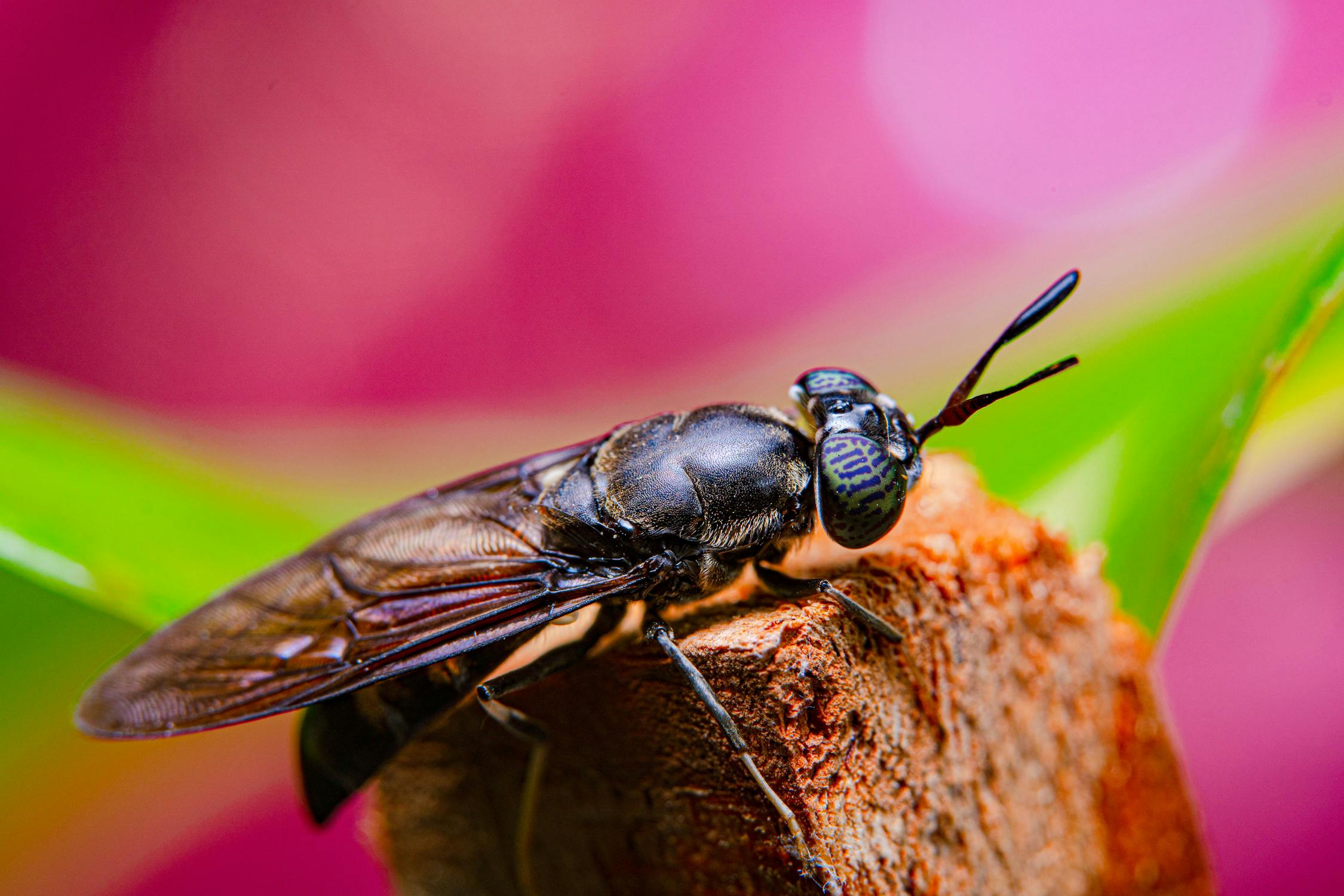In the world of entomology, one species stands out for its versatility and contribution to sustainability: Hermetia illucens, more commonly known as the black soldier fly. This humble insect, often overlooked due to its unassuming appearance, has become a star in a range of industries, from waste management to sustainable agriculture. But what makes Hermetia illucens so unique, and how can it benefit both the environment and various sectors of the economy? In this article, we will explore the black soldier fly’s lifecycle, its uses in waste recycling, animal feed production, and its role in sustainable agriculture.
What is Hermetia illucens (Black Soldier Fly)?
The black soldier fly (Hermetia illucens) is a species of fly belonging to the family Stratiomyidae. Native to the Americas, it has spread across the globe due to its hardiness and ability to thrive in diverse environments. Unlike common house flies, black soldier flies do not carry diseases, making them a beneficial species for various human activities.
Hermetia illucens undergoes four stages of development: egg, larva, pupa, and adult fly. The larvae, which are typically the most studied, are the primary agents of interest in terms of sustainability applications due to their incredible ability to decompose organic matter and convert it into valuable biomass.
The Life Cycle of Hermetia illucens
The black soldier fly’s life cycle consists of several distinct stages, each playing a key role in its environmental utility:
- Eggs:
Female black soldier flies lay their eggs near decaying organic material, where larvae will later feed. These eggs hatch within a few days, depending on environmental conditions like temperature and humidity. - Larvae:
The larvae are the most important stage in the life cycle of Hermetia illucens. These larvae, often referred to as “BSF larvae,” are voracious feeders that can consume a wide variety of organic waste, including food scraps, agricultural byproducts, and even manure. They are capable of breaking down material at a fast rate, converting it into protein-rich biomass. - Pupae:
After the larvae have consumed enough organic matter and grown, they enter the pupal stage, where they transform into adults. During this time, they do not feed and are dormant. - Adults:
The adult black soldier fly has a relatively short lifespan, typically living only a few days. Its primary role is reproduction. Adult flies are non-feeding and do not pose any harm to humans, animals, or plants.
The Role of Hermetia illucens in Waste Management
One of the most exciting aspects of Hermetia illucens is its ability to recycle organic waste efficiently. Black soldier fly larvae can consume large quantities of food waste, agricultural residues, and even animal manure, turning these into high-protein biomass. This makes Hermetia illucens a powerful tool in managing food scraps and reducing landfill waste.
1. Organic Waste Recycling
The larvae are particularly adept at digesting food waste, such as vegetable peels, meat scraps, and even food packaging waste. In the process, they break down these materials into simpler organic compounds, significantly reducing their volume and creating valuable biomass. This recycling process can help reduce the environmental impact of landfills, where food waste often contributes to methane emissions—a potent greenhouse gas.
2. Composting and Fertilizer Production
After the larvae consume the waste, they can be harvested for further processing. The remaining frass (larval excrement) can be used as a nutrient-rich compost or organic fertilizer for agricultural applications. This waste-to-fertilizer process enhances soil quality and provides an eco-friendly alternative to chemical fertilizers.
3. Decomposition of Animal Manure
In agricultural settings, Hermetia illucens larvae are particularly useful for processing animal manure. The larvae can break down the manure into valuable organic materials that can be repurposed as fertilizers. This method not only helps control waste but also reduces the environmental pollution that typically comes from excessive manure production.
Hermetia illucens in Animal Feed Production
Another revolutionary application of Hermetia illucens is in animal feed production. The larvae are rich in protein and fat, making them an excellent substitute for traditional feed sources, such as soy or fishmeal, which are often linked to deforestation and overfishing.
1. Sustainable Protein Source
BSF larvae contain up to 40-50% protein and 30-40% fat, making them a high-energy, protein-rich food for livestock, poultry, and aquaculture. By replacing conventional feed with black soldier fly larvae, we can significantly reduce the environmental impact of animal farming, such as land use, water consumption, and greenhouse gas emissions.
2. Aquaculture and Poultry Farming
In aquaculture, Hermetia illucens larvae are particularly beneficial as they can provide a sustainable and nutritionally rich food source for fish and other aquatic species. Similarly, poultry and pigs benefit from BSF larvae as a high-protein supplement to their diets. This not only improves the overall health and growth rates of the animals but also helps reduce the dependence on feed ingredients that have significant ecological footprints.
Hermetia illucens and Sustainable Agriculture
Sustainability in agriculture is becoming increasingly important as the global population continues to grow and climate change exerts pressure on food systems. Hermetia illucens is emerging as a game-changer in promoting sustainable farming practices.
1. Reducing Waste and Promoting Circular Economy
By integrating Hermetia illucens into agricultural systems, farmers can create a circular economy. Wastes from one part of the farm (like food scraps or manure) can be transformed into valuable protein for animal feed and fertilizer, which can then be used to improve soil health and crop yield. This reduces the need for synthetic inputs and minimizes waste, contributing to more sustainable farming practices.
2. Enhancing Soil Fertility
The frass left behind by black soldier fly larvae is rich in nutrients such as nitrogen, phosphorus, and potassium, all of which are essential for plant growth. When used as a natural fertilizer, this organic matter can enhance soil fertility, reduce the need for chemical fertilizers, and improve the long-term health of the soil.
The Future of Hermetia illucens in Industry and Sustainability
The growing recognition of Hermetia illucens as a sustainable solution to food waste, animal feed production, and soil enrichment has led to increased interest in commercializing its use. Numerous startups and established companies are now exploring black soldier fly farming, investing in technology to scale up larvae production and optimize the waste recycling process.
As the global demand for sustainable solutions continues to rise, Hermetia illucens offers an exciting opportunity to address some of the planet’s most pressing challenges, including food waste, resource scarcity, and environmental degradation.
Frequently Asked Questions (FAQs)
1. What are the benefits of using Hermetia illucens in waste management?
The larvae of Hermetia illucens are highly effective in recycling organic waste by breaking down food scraps and agricultural residues. They reduce the volume of waste, decrease methane emissions from landfills, and produce nutrient-rich compost and fertilizer.
2. Can Hermetia illucens larvae be used for human consumption?
While Hermetia illucens larvae are not commonly consumed by humans in many cultures, they are safe to eat. In some countries, insect protein is already being explored as a sustainable food source, especially for people in regions where food security is a concern.
3. How can Hermetia illucens contribute to sustainable farming?
Black soldier fly larvae can process organic waste into valuable feed for livestock, poultry, and fish. Additionally, the larvae’s frass can be used as a natural fertilizer, promoting soil health and reducing the need for synthetic fertilizers.
4. Is Hermetia illucens farming profitable?
With increasing demand for sustainable animal feed and waste recycling, Hermetia illucens farming has become a profitable venture for many entrepreneurs. The high protein content of the larvae and their ability to process organic waste make them an economically viable solution.
Conclusion
Hermetia illucens, or the black soldier fly, has proven itself to be more than just an insect; it is a valuable ally in promoting sustainability and addressing some of the world’s most pressing environmental challenges. From waste management and animal feed production to enhancing soil fertility, the black soldier fly offers practical, eco-friendly solutions for a more sustainable future. As more industries begin to embrace the potential of Hermetia illucens, it is clear that this unassuming insect will continue to play an important role in shaping a more circular and sustainable economy.











